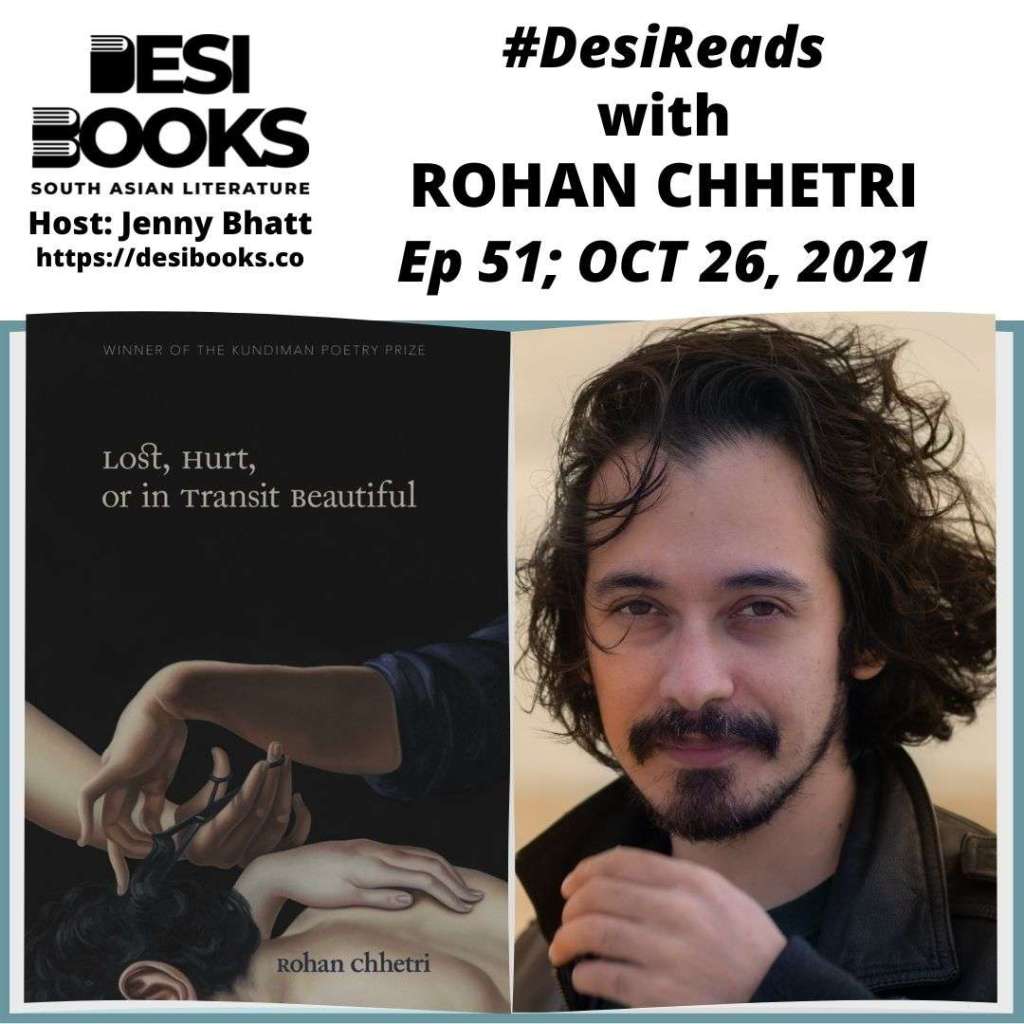

Desi Books Ep 51 w/ Rohan Chhetri – Desi Books
(available at Anchor.fm, Spotify, Apple Podcasts, Castbox, Google Podcasts, Stitcher, TuneIn, Breaker, Pocket Casts, RadioPublic, Overcast)
Hello and welcome to Episode 51 of Desi Books—news and views about desi literature from the world over. I’m your host, Jenny Bhatt. Thank you for tuning in.
Today, in the #DesiReads segment, we have Rohan Chhetri reading from his latest poetry collection, Lost, Hurt, or in Transit Beautiful.
#DESIREADS WITH ROHAN CHHETRI — INTRODUCTION
Rohan Chhetri is a writer and translator. He is the author of Slow Startle (Winner of the Emerging Poets Prize 2015), and Lost, Hurt, or in Transit Beautiful (Tupelo Press/ HarperCollinsIN, 2021). He has co-edited Shreela Ray: On the Life and Work of an American Master (Unsung Masters Series, 2021) along with Kazim Ali. A recipient of a 2021 PEN/Heim Grant for translation, his poems have appeared in The Paris Review, Revue Europe, AGNI, and have been translated into Greek and French.
In Rohan Chhetri’s Lost, Hurt, or in Transit Beautiful, inherited literary forms—the ode, the lyric, and pristine tercets—are juxtaposed with gorgeously fractured and stylistically daring hybrid pieces. The end result is a work in which poetic technique is brought to bear on lingering questions of identity, artistic tradition, and the cruelty implicit in language itself. Here, form, grammar, and syntax function as a kind of containment, but also, a ‘ruined field’ that is rife with possibility. Chhetri dramatizes and resists the ways language, and its implicit logic, limit what is possible within our most solitary reflections, defining even those ‘vague dreams’ that in the end we greet alone. ‘This is how violence enters / a poem, ‘ he explains, ‘through a screen / door crawling out & Mother asleep on the couch.’ These pieces are as lyrical as they are grounded, and as understated as they are ambitious. ‘In my language, there is a name for this music, ‘ he tells us. As his stunning collection unfolds, Chhetri reminds us, with subtlety and grace, that the smallest stylistic decisions in poetry are politically charged. This is a haunting book.—from the Kundiman Prize Citation.
“Death in these poems is no individual predicament but an ever-present afterlife that bonds us to and locates us in widening circles of entanglement: our kin, our errant friends, our villages, our borderfolk, our myths of nationhood and personhood. Chhetri dares to feel and sing this community elegy, and does it in a fierce, inventive, startling, restless language that seems entirely its equal; and trains us, by the book’s last sequence, towards ever purer gestures of agility and thought.” ~Vivek Narayanan

Lost, Hurt, or in Transit Beautiful by Rohan Chhetri juxtaposes inherited literary forms with stylistically hybrid pieces to explore questions of identity, artistic tradition, and the cruelty implicit in language itself. An excerpt in #desireads @DesiBooks
Tweet
The transcript of this excerpted set of poems is also up on the website.
And now, here’s Rohan Chhetri.
DESIREADS WITH ROHAN CHHETRI
[Excerpted with permission from Lost, Hurt, or in Transit Beautiful by Rohan Chhetri. Copyright © 2021 Rohan Chhetri.]
THE SINGING BONE
The shaman comes to the valley after midnight
Circling our boarding house. Pinned to our small beds
In terror, we listen to the clean music of bones.
Later, through a rift in the curtain we squint into the mist
But cannot see the past from a man
Blowing the trumpet of a suicide’s hollow shinbone.
Twenty years will pass before I understand this music
Robbed from a grave. Sleepless in the new world,
Listening to the laboring salt trucks make rounds
On the frozen streets, it will come back to me
All at once: the echo chamber of the creaking bamboo
Grove where we smoked our first cigarette,
The army of deaf and mute in the village who spoke
Only in obscene gestures, the lonely daughter
From the herbarium who wrote letters to us
In a hen’s scrawl. The old house replaced
By something modern, architecture standing in
For a woman’s death. Her husband’s slow breakdown
Coursed for months, the clocks telling him to jump
Off a cliff, the second marriage hurried in mourning.
The white seed of lunacy sleeps, then swells to its fate.
But all our fears of summer snakes & rabid dogs,
Everything depended on them granting us safe passage
Through fields redolent with the smell of semen
After a night of rain. Caught in the downpour,
We stood under eaves of caves. The wind churned,
Some vegetation pushed up lightless from the silver-blue
Mud. We hollowed hovels out of lantana brambles
Where we spoke in the voices of already grown men.
In winter, I traveled down as the coiling roads of the world
Grew dark. I held my insides, bile-soaked, where joy
Trembled. Prospect of home washed in the retch
Of anxiety. My history of nausea in the cold half-
Light of childhood, where did it come from? Mother,
Or the long descent in the old manner of hell—
The asphalt frozen, slippery all the way home.
The shaman returns the next morning for alms,
Turmeric, rice, strip of black cloth. We circle him,
The mystification undone in daylight. Just a man bruised
From the cold, with children starving somewhere
In the mountains across the border, as we sit here
Goading him to reveal to us the singing bone.
“Twenty years will pass before I understand this music / Robbed from a grave. Sleepless in the new world, / Listening to the laboring salt trucks make rounds . . .” Rohan Chhetri in Lost, Hurt, or in Transit Beautiful #DesiReads @DesiBooks
Tweet
BORDERSONG
We lived downwind of a bakery,
butter sesame roasted black cumin.
From a mosque downwind drifted prayer
erasing the gummy hour of the wolf,
sleepy holler of a child muezzin.
We lived downwind of a temple. Incense,
synonymous with the clear earache of a gong
haloing a bell’s rim before withering to the ground.
Downwind of a cremation ghat, incense,
another kind: cloying, rot-sweet,
burning flesh masked in clarified butter woodsmoke hunger
all synonyms for the Lord’s true name.
From the butcher-shop, downwind musk of flensed pelt,
shit-gutted intestines, opaque green eyes on severed goat heads.
Downwind we lived too of the army barracks, once
a youth club, our tennis tables moonlighting
for the feast of soldiers.
In the night fragrant with the tea gardens’ first flush
we heard the pain-astonished men thrashing upside
down as a baton tore welts into their calves.
Our tall house stood downwind of a peaceful kingdom’s border.
Odor of fermented betelnut. What the Rimpoche once
bestowed to the cannibals in lieu of their blood-
rimmed thirst & craving of gnawbone.
Then one night, truck after stealth-green
truck full of families packed to the hull
like horses for the New World.
Downwind of the grimy brothels in the border town
we visited as boys, petrified we would run
into our own fathers.
Smell of talcum & attar
that bloomed at nightfall & withered by dawn
on a long Bhutanese street called Chinese Line.
All the nameless villages in between blurred
in the nightly music that blared from loudspeakers
to scare the elephants marauding the fields.
Downwind of the two severed heads of the Liberation
Front leaders hung from a branch of a guava tree
in the putrid summer of the old revolution.
& The women marched in gunmetal silence:
torches blinking in the rain, rhyme of slogans
plucked from their cleaved tongues.
Downwind blew kerosene & ragsmoke
in some young martyr’s evening.
“[We lived ] Downwind of the grimy brothels in the border town / we visited as boys, petrified we would run / into our own fathers.” Rohan Chhetri in Lost, Hurt, or in Transit Beautiful #DesiReads @DesiBooks
Tweet
MEZZA VOCE
All summer the half voice lurked behind me
& I played deaf for days for to live
To not write about it to use my body
Part the river’s flesh to operate
Machinery is human too to love
& for once stay awake through it all.
Now it comes like the deer sleeved
Out of the green in clean staccato
All corpuscle & hunger—No, not the deer
The ravens calling for the wolves to split
Open the light from the dead deer’s belly
Jeweled in the dark purse of its pelt.
We are each given heaven for brief so heavy
We put it down dance small around it.
Lost, Hurt, or in Transit Beautiful by Rohan Chhetri juxtaposes inherited literary forms with stylistically hybrid pieces to explore questions of identity, artistic tradition, and the cruelty implicit in language itself. An excerpt in #desireads @DesiBooks
Tweet
You’ve been listening to episode 51 of Desi Books—news and views about desi literature from the world over. I’m your host, Jenny Bhatt. Thank you for tuning in. Today’s #DesiReads segment was with Rohan Chhetri reading from his latest poetry collection, Lost, Hurt, or in Transit Beautiful.
Episode 52 will be up shortly. Follow on Twitter @desibooks, Instagram @desi.books, Facebook @desibooksfb. Tag the accounts if you have requests or suggestions. Please go to the website, desibooks.co, if you’d like to sign up for the free, weekly newsletter. And please share this on via social media to support the poet and help raise the tide of South Asian literature. Thank you.
Stay healthy, keep reading, and write well.
[music]
NOTE: If you like the work being done at Desi Books, you can leave some appreciative feedback and sign up for the free, weekly newsletter. And please share this with other readers who might be interested. Remember: A Rising Tide Lifts All Boats.™
Join the Conversation
